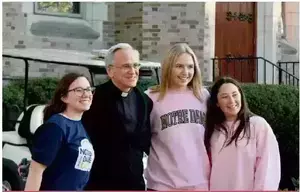 "
"
The year was 2005. The Xbox 360 was about to hit the market. Prince Charles was getting married again. Tom Cruise had successfully completed two missions that now, five missions later, are beginning to seem not all that impossible.
Most importantly, we here at Scholastic had just published a full spread on the dapper new president of Our Lady’s University, the Rev. John Ignatius Jenkins, C.S.C.
In a series of interviews with his former professors, peers and Jenkins himself, writer Dave Poell sets the stage for a show that is now drawing its curtains after 19 full years.
“Portrait of a President” sought to give its readers an idea of who had just been chosen to lead them into the 21st century. Jenkins is portrayed as an academic, one willing to subject himself to the many meetings his administrative life would bring, but reluctant to leave behind his books. When asked what his favorite books were, Jenkins named works by Aristotle, Augustine, Plato and Aquinas. His former professor, Paul Weithman, told Scholastic: “He’s a very studious guy and, had circumstances been different, I’m sure he would have been committed to a life of scholarship.”
Poell walked down the path of Jenkins’ academic life, starting with his years as an undergraduate under the dome in the 1970s. Jenkins then went on to pursue his interests in philosophy and theology to the highest level at Oxford and later Berkeley in the ‘80s. It was these philosophical wanderings that left him asking, “If I was to do something, what work would I do which would be such that, if I had to give my life for it, I could do it? What would be that important to me?” The answer was religious life. In 1983, Jenkins was ordained a priest at the Basilica of the Sacred Heart on Notre Dame’s campus.
After furthering his education in Europe and throughout the United States, Jenkins returned to Notre Dame in the early ‘90s. Here he climbed, somewhat accidentally, through the administration to the role of associate provost. Jenkins said of the climb in 2005: “I must say that it wasn’t something I aspired to, but it’s something I did and I enjoyed the work that I did.”
This unassuming attitude radiates through Poell’s profile. He said that though “an intellectual heavyweight and now a man of great power, Jenkins still comes across as the quintessential Midwestern boy from Omaha who seems wholesome and trustworthy — two qualities that are essential for any effective leader.”
After spending the last year of Jenkins’ tenure by his side, former Student Body President Daniel Jung said “the idea of [Jenkins] as the quintessential Midwest Catholic still rings true.” Jung completed the trifecta of Midwest descriptors, emphasizing Jenkins’ “intense humility.” Humble, wholesome and trustworthy, Jenkins’ Midwestern nature has held strong even after nearly two decades of great power.
Despite all the praise, there remained some doubts surrounding the new leader on campus. As Poell wrote in 2005, “While nobody will deny Jenkins’ personable nature, one can’t help but wonder how this genial, soft-spoken man will make his mark.” Confronted with these doubts 19 years later, Jung’s response was simple: “Just look at the tape.”
Fair enough. Jenkins has had an impressive reign. He has guided Notre Dame through some of its most tumultuous times and done so by staying true to the plan he set out for himself at the start.
Jenkins told Poell: “[Notre Dame] aspires to be better, and at the same time it is the only one of the top universities in the country that has a religious character.” Many saw this character as something that was holding Notre Dame back from securing the top students and faculty. Jenkins challenged his contemporaries by seeing this difference not as a detriment, but as an opportunity. He insisted, “We strive to be different and distinctive because what we are is a Catholic university, and not in a narrow way, but in a rich way that makes everything about us richer.”
This effort to grow forced Jenkins to leave behind his classical roots. Under his guidance, Notre Dame has transformed into a premier research institution. It is now the only religious school in the Association of American Universities, the top research group in the country.
This growth has made Notre Dame richer in more ways than one. The university’s endowment has grown from $3.7 billion to $18.9 billion in the last 19 years, more than a 400% increase.
This has allowed Notre Dame to secure its standing among the top schools in the world, and would shock the university’s seventh president, the Rev. Andrew Morrissey, C.S.C., who exclaimed, “We can never compete with those colleges that have such tremendous endowments!”
Notre Dame has changed in the last 19 years, but the questions surrounding it sound familiar. How does a school with a Catholic identity remain relevant in an increasingly secular world? What does it mean to be Notre Dame? Why can’t the Irish win every big football game?
For the first time in a while, Our Lady’s University will have to answer these without Fr. John Jenkins behind the wheel. It truly is the end of an era.